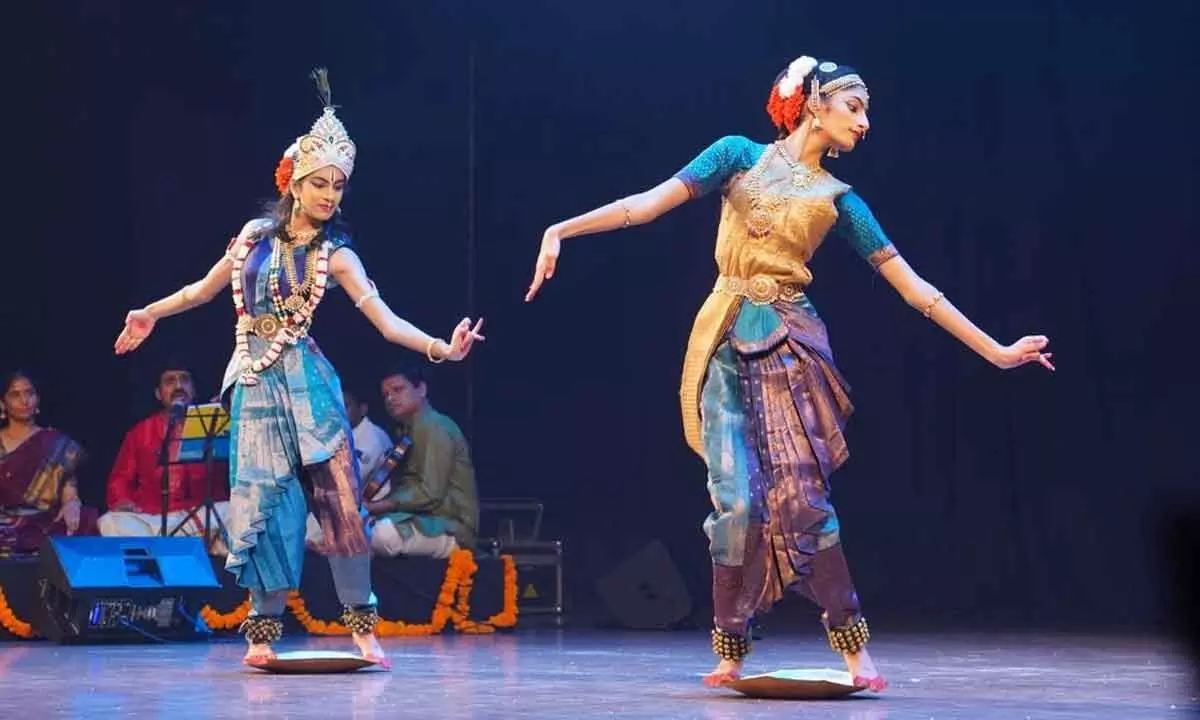Live
- They always want me to win, and now I feel lucky to have been offered a story like ‘Zebra’: Satyadev Kancharana
- ‘Democracy first, humanity first’: PM Modi in Guyana's parliament on two countries' similarities
- PKL Season 11: Telugu Titans register third straight win to top standings
- Is Pollution Contributing to Your COPD?
- NASA Unveils Underwater Robots for Exploring Jupiter's Moons
- Additional Central forces arrive in violence-hit Manipur
- AR Rahman and Saira Banu’s Divorce: Legal Insights into Common Issues in Bollywood Marriages
- 82.7 pc work completed in HPCL Rajasthan Refinery area: official
- Curfew relaxation extended in 5 Manipur districts on Friday
- Tab scam prompts Bengal govt to adopt caution over fund disbursement
Just In
Spectacular Kuchipudi Rangapravesham by Sisters Trikha and Mishka Gowd


Sisters Trikha and Mishka Gowd delivered a captivating debut Kuchipudi Rangapravesham under the guidance of Guru Jyothi Reddy, their performance was a blend of vibrant aharya, expressive gestures, and intricate footwork, enthralling the audience
Sisters Trikha and Mishka Gowd delivered a captivating debut Kuchipudi Rangapravesham under the guidance of Guru Jyothi Reddy. Their performance was a blend of vibrant aharya, expressive gestures, and intricate footwork, enthralling the audience.
Shilpakala Vedika on Sunday evening was the venue for this spectacular debut by the Gowd sisters, students of Guru Jyothi Reddy. Her dance school, titled “Jyothi Kalakshetram, School of Arts,” was represented with pride. A host of celebrities, including eminent cine actor Suman, graced the occasion.
Jyothi is totally dedicated to teaching young and aspiring students and derives joy in watching her ideas and thoughts visualised into much-appreciated performances on stage. Trikha, the elder sister, is studying in the eleventh grade at Chirec, while younger sibling Mishka is in the ninth grade. The sisters expressed that, though at first, they were reluctant to learn and tried to avoid dance, urged by their mother and Jyothi’s patient teaching, they developed a keen interest and came to understand the joy of dancing and that it was also a form of worship.
The aharya was vivid with different glowing sharp colours but similarly patterned for both as they emerged on stage wrapped in beams of dazzling multi-coloured lights conjured by our local Wizard of Light artistry, Basavaraju. The vocalist with an exceptionally melodious voice, Mantha Srinivas, along with an equally matching orchestra, provided wonderful support for the artistes. The percussion and nattuvangam were admirably done, essential adjuncts for any dance performance.
As is customary to commence a dance recital with a prayer to Lord Ganesha, the Elephant Headed God, to remove all obstacles and ensure the program’s success, “Dasha Rasa Ganapathim” in ragamalika was an auspicious item to begin with. As per Natya Shastra, there are nine major rasas (navarasas) in Indian culture. However, composer Ravikiran contends that sorrow (shoka) and compassion (karuna) should not be clubbed into one as the two are distinct. Therefore, the alluring Lord was praised through dance as the one who contains ten rasas, thus giving the composition its title. The sisters performed with conspicuous talent, and their expressive gestures depicting the rasas one by one in cameo form enthralled the audience.
Dasavataram in mohanam describes the stories of the ten incarnations assumed by Lord Vishnu to protect dharma and destroy evil. The ten avataras: Matsya (Fish), Kurma (Tortoise), Varaha (Boar), Narasimha (Man-Lion), Vamana (Dwarf), Parasurama (Axe-Wielder), Rama, Krishna, Buddha, and Kalki are symbolic representations of the evolution of man. This was a vigorous and exhilarating piece with many sculpturesque poses done in succession by the duo, which evoked applause.
Krishna shabdam in mohana is one of the staple items of the Kuchipudi repertoire. It is supposed to have been originally composed by Munipalli Subramaniam Kavi, the court poet of KalahasthiSamasthanam for the ruler Raja Damera Venkatappa Nayaka. This shabdam is an exquisite composition performed with delicate abhinaya by Mishka. The charm of this traditional song lies in the fragrance of sringara rasa. Here, the Nayika, or heroine, eagerly waits for her beloved Krishna to come to her. She is enthused with her affection for Krishna and exposes the outpouring of emotions which she cannot suppress. He is epitomized as being as handsome as innumerable Manmathas. The Prince of Dwaraka is desired to come and reach his beloved. The phrase “Moon of the Yadu Clan” is the popular refrain repeated to build up to a crescendo of rhythmic melody. Mishka elegantly enunciated in graceful movements in nritta as Krishna is praised as the “Stealer of Ladies Hearts, Equivalent to Meru Mountain, Patron of Poets, Vanquisher of Enemy Kings, and with the Lustre of Jewels.”
Saraswathi stuthi, praising the Goddess of Learning, extolls her as dressed in pure white, seated on a white lotus, being the giver of knowledge, music, arts, wisdom, and nature. This prayer invoking her blessings for eloquence and knowledge was fittingly done by Trikha, dressed in a serene white-hued costume that glowed in the warmth of the golden rays showered down by the light effects.
The final climactic piece was a Narayana Teertha tarangam by the duo together, culminating in a mangalam to take leave of the audience. “Neela Megha Shareera” (Balagopala tarangam) with its lilting tune was perfect as Trikha appeared in the role of Krishna with a glittering crown adorned with peacock feathers to counterpoise Mishka in blue gold attire. The life story of Krishna, including his birth and childhood pranks culminating in his marriage to Rukmini, was deftly enacted by the pair of dancers in a virtuoso fashion to balance the simple but effective lyrics. The item ended with a surpassing display of intricate footwork patterns while dancing on the rim of a brass plate, coordinating with the musical jathis.

© 2024 Hyderabad Media House Limited/The Hans India. All rights reserved. Powered by hocalwire.com






